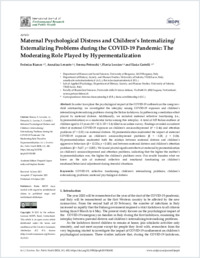Maternal psychological distress and children’s internalizing/externalizing problems during the COVID-19 pandemic : the moderating role played by hypermentalization
- Bianco, Federica Department of Human and Social Sciences, University of Bergamo, Bergamo, Italy
- Levante, Annalisa Department of History, Society, and Human Studies, University of Salento, Lecce, Italy - Lab of Applied Psychology, Department of History, Society, and Human Studies, University of Salento, Lecce, Italy
- Petrocchi, Serena Faculty of Biomedical Sciences, Università della Svizzera italiana, Switzerland
- Lecciso, Flavia Department of History, Society, and Human Studies, University of Salento, Lecce, Italy - Lab of Applied Psychology, Department of History, Society, and Human Studies, University of Salento, Lecce, Italy
- Castelli, Ilaria Department of Human and Social Sciences, University of Bergamo, Bergamo, Italy
-
04.10.2021
Published in:
- International journal of environmental research and public health. - MDPI. - 2021, vol. 18, no. 19, p. 17
COVID-19
Reflective functioning
Children’s internalizing problems
Children’s externalizing problems
Maternal psychological distress
English
In order to explore the psychological impact of the COVID‐19 outbreak on the caregiver–child relationship, we investigated the interplay among COVID‐19 exposure and children’s internalizing/externalizing problems during the Italian lockdown, hypothesizing a mediation effect played by maternal distress. Additionally, we included maternal reflective functioning (i.e., hypermentalization) as a moderator factor among this interplay. A total of 305 Italian mothers of children aged 6–13 years (M = 10.3; SD = 2.4) filled in an online survey. Findings revealed an indirect effect of maternal COVID‐19 exposure on children’s anxious/depressed (k2 = 0.46) and attention problems (k2 = 0.32) via maternal distress. Hypermentalization moderated the impact of maternal COVID‐19 exposure on children’s anxious/depressed problems (β = −1.08, p = 0.04). Hypermentalization moderated both the relation between maternal distress and children’s aggressive behaviors (β = 12.226; p < 0.001) and between maternal distress and children’s attention problems (β = 5.617, p < 0.001). We found pivotal significant effects of maternal hypermentalization on children’s anxious/depressed and attention problems, indicating that the higher the mother’s hypermentalization was, the higher the children’s problems were. Our results broaden what we knew on the role of maternal reflective and emotional functioning on children’s emotional/behavioral adjustment during stressful situations.
- Language
-
- English
- Classification
- Medicine
- License
- Open access status
- gold
- Identifiers
-
- RERO DOC 333719
- DOI 10.3390/ijerph181910450
- ARK ark:/12658/srd1319330
- Persistent URL
- https://n2t.net/ark:/12658/srd1319330
Statistics
Document views: 254
File downloads:
- Texte intégral: 464
